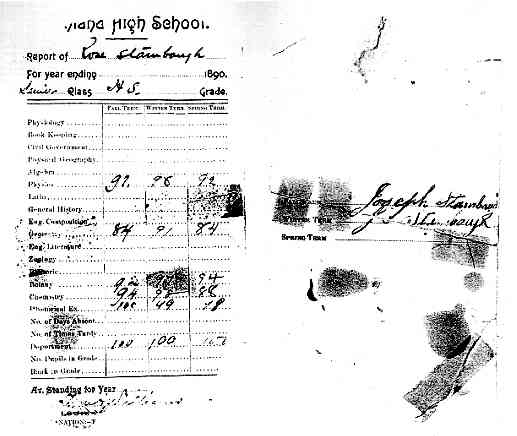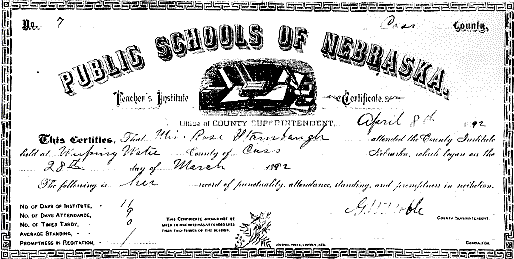
Rose Stambaugh
Rose Stambaugh graduated from Ashland High School in 1891. She was her class valedictorian and delivered the valedictory address at her graduation. She was a very good student and went on to be a teacher until she married Adelbert Stanley.


Rose's Senior Year Report Card

Rose studied Physics, Geometry, Botany, Chemistry, Rhetorical Exercise and was also graded in Deportment. Her report card was signed by her father, Joseph Stambaugh.


Rose's Valedictory Address
"Launched But Not Anchored"
History never wearies in covering with imperishable praise the deeds of its heroes. It lingers over their struggles with intense sympathy and lively hope, and hovers over their successes with pride and adoration. History has been, as it were, a painter who has used the Past for his canvas and Time for his brush; who has portrayed and painted in its truest colors, the hero, the martyr and the genius, whose excellence of character, sincerity of purpose and devotion to home and country made possible our present civilization -- and as this painter's canvas is stretched before us, we are permitted to view and to study the career of these good and great people, who have made the world better for having lived in it. We are allowed to know the conditions and circumstances under which they were launched and to follow them over their different seas to their different ports of anchorage. And, while the launching of some has been upon calm seas and beneath sunny skies, we find the launching of the mass to have been upon troubled waters and beneath threatening clouds. Yet, too, on this same canvas, we behold in the career of those whose launching was propelled by tender influences and opulence, there came a time when their bark was, either to be moored by their independent strength, or to be gulped in the gulf of the lost. And 'twas this and this alone that decided their worldly anchorage. While with those whose launching was impeded by poverty and o'ershadowed with every danger, and whose sea seemed ever actuated with wrath, there came a time when noble perseverance and endurance rolled away the blackness of the lowering clouds, as though before the dispelling breath of God, and suddenly the sunshine assumed its sway. And so we find scarce a similarity in the conditions of any two careers; for, as far over the waters as History has pictured it, we see, floating by the side of some gallant and royal-flagged craft, a wreck weather beaten and torn, and which is now and then, "bobbed up" by the supporting waves; and we look and wonder and ask, how is this, that the two barks, sailing with the same wind and upon the same water can be, in all else, so widely separated? But Reason tells us that the success of the one depended, so to speak, upon the steadfast will of the helmsman, who halted not between two opinions, but who had power to choose the one way and reject the other; while the wreck of the other lay in the fact, though the helmsman longed for the merchandise, he fain would keep the price, and so stood chaffering with fate in vexatious altercation till the night came and the fair was over. But with all the barks that have ever put to sea, there has been one thing in common -- each one has had to bear its own carry of trouble: in other words, to every career there has been a care, to every man his burden, if not at the time of launching before or at the anchorage. And it is right, that to every station there should be a care, to every man his burden; for if the poor did not sometimes so far feel poverty to be a burden, as to desire to better their conditions and seek to "rise in life", their most valuable energies would never be aroused and we should not witness that spectacle, which is so common in the land we live in; namely, the successful struggle of manly labor against adverse fortune -- a struggle in which the triumph of one, gives hope to thousands, and causes many a bark singing beneath the stamp of ill-luck, to unfurl its sails and leave the harbor, the triumph that acts as it were, as a broom to sweep the cobwebs from the windowsill of the helmsman's brains, and he awakes to know how little a space one sorrow really makes in life; and finds to his pleasant surprise, that it was not an adamantine rock that his vessel stuck, but that it was only a sand-bar. Some, it is true, never reach their ideal destiny but are crushed beneath the weight of their cares, and are over-thrown in the depth of the whirlpool, all because they hewed their oars out of light material, or allowed them to rest idly in loose locks, in either case, to be borne away by the first counter current, and the bark and its oarsman left to the mercy of the winds, which, unconstant as all winds are, dash him hither and thither upon the waters, or drift him relentlessly into the sargasso of self-crushed energy; from whence he can see other barks sailing to their respective ports. Some pass him manned with the glory of truly colored honors' while others glide by, without pomp, without notoriety and without ostentation to a sure and happy anchorage. And still others float by apparently secure, and all at once there comes a swift gust and he has a companion in the calms, the misery of which nothing but religion can repair.
MY CLASSMATES: You have chosen me to express your sentiments. Yet my lips almost refuse to speak when I remember that life in the Ashland schools is over forever. Our school years are now history. The old chronicle is before us, and the sedate muse from her graven tables dictates for the future. We have the most of us been joined together in aims and interest for eleven years and have so often worked and planned together in harmony for our common good, that now to separate, is like breaking the tissues of united strength. Ah, it is with sadness that we leave this school, yet with sadness brightened by so many pleasant memories; but now that we are safely launched, let each one of us so act as an independent helmsman to guide his own bark to a noble anchorage; then wherever the future shall find us, however high our names may be inscribed on the roll of fame, let us never forget that the opportunities that the Ashland school afforded, made it possible for us to succeed. We can never bring back the past. It has gone forever, and will be fresh only as memory shall recall it; but before us the path of duty lies and 'tis nothing to know of what we have been unless it is with a desire of knowing that which we ought to be. Then over those things of the past whose memory will not in some measure make us better, let us set the stone of silence, strike it sharply into place and turn it forever. Then with nothing but the virtues of truth to inspire us, let us pursue the duties of the future, confidently, calmly, and courageously that we may each and all reflect on the Ashland school, noble honors and be better prepared to run our bark over the stormier waters of life to an anchorage in the light house of safety, when night shall have called us home; when the grand circle is rounded and mans' past and mans' future meet where Time disappears. Let this one thought be the guiding star of the Class of '91's destiny as we say to her and to each other, Farewell.


Recommendation for Teaching Position
Ashland, Nebr. July 5, 1891
Dear Sirs:
This may certify that Miss Rose Stambaugh who has applied for your school is a graduate from our high school and that I consider her fully competent to take charge of your school. She is good in scholarship, having what will entitle her to a first grade certificate after she has taught the required time; she is earnest and full of that enthusiasm which makes the successful teacher. I have never known Miss Stambaugh to fail in anything she has undertaken hence I am prepared to guarantee you that she will succeed as teacher in your school. I am pleased to recommend Miss Stambaugh and hope I may congratulate you on her election.
Cordially,
J.W. Crabtree
Supt. of Schools


Rose's Teaching Certificate



Reprinted from Ashland Gazette: 12/17/1892
Rose Stambaugh is teaching the same school she taught last year. Rose is one of our successful graduates of whom the school is proud.



